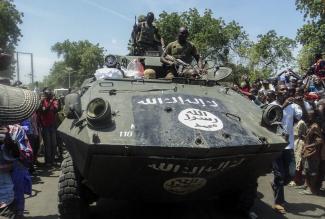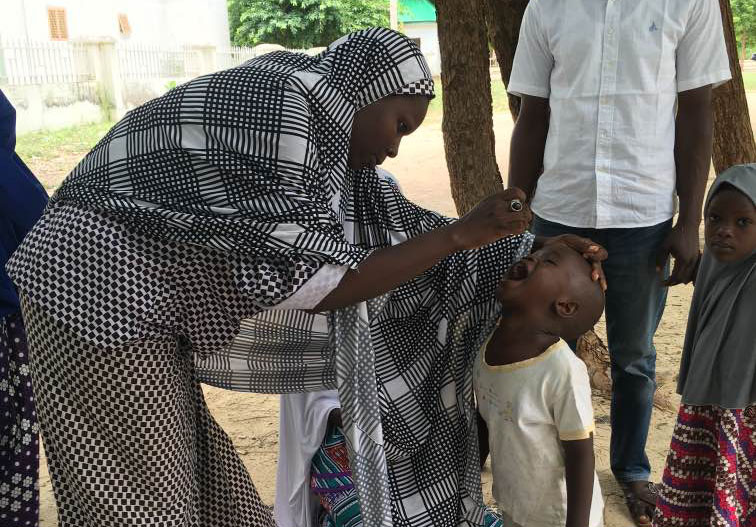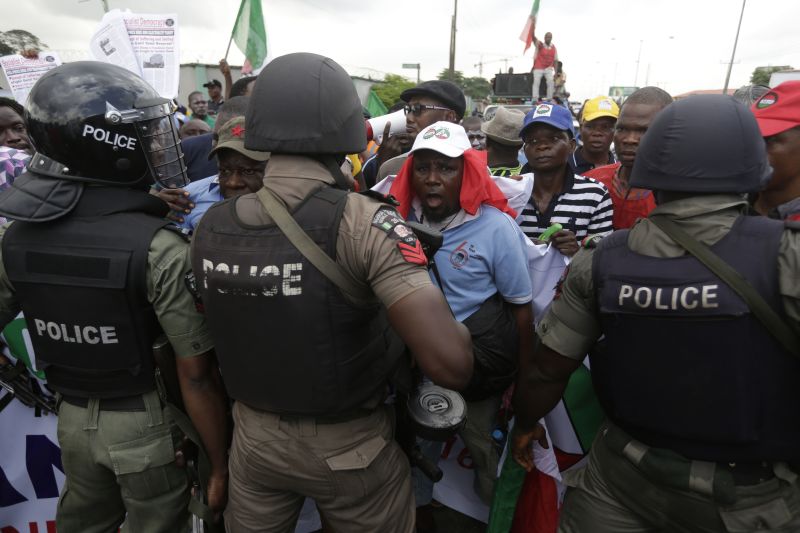Terrorism
Strong military, poor performance

When the terrorist group Boko Haram abducted more than 200 schoolgirls in April, the international outcry was great. Nigerians, however, had been subjected to attacks by this group for a long time, particularly in the poor north of the country.
“Boko haram” means “western education is sin”. This sect was founded in 2001 under the leadership of Mohammed Yusuf, a young Islamic preacher. The group became known in 2009 because of attacks in north-eastern Nigeria, when it burned down churches in Maiduguri and killed more than 1,000 people. President Umaru Musa Yar’Adua ordered military action, and the police killed Yusuf without any court trial. Boko Haram regrouped and has become one of the deadliest terror groups in Africa.
Nigeria has effective institutions and a strong military. However, the war against the group proved difficult for several reasons. First of all, Boko Haram initially gave the impression it was pro-Islam, in a bid to win the support of the people in the north. In the region where it mostly operates, over 70 % of the population are Muslims. The sect found recruits among the poor youth, most of whom lacked a sustainable livelihood.
Nigeria’s north lags behind other regions in terms of education and literacy. It was easy for the sect leaders to manipulate religious sensitivities and make people follow their twisted version of Islam. Nigeria has witnessed several spells of military rule, and the top leaders of those authoritarian regimes were mostly from the north. Nonetheless, the lack of education has perpetuated the cycle of poverty especially in that region, and the gap between a few rich and masses of poor keeps growing.
Stating it wanted to avenge the murder of its leaders, Boko Haram relaunched in September 2010. It has attacked a wide and diverse range of targets: the UN House in the capital Abuja, law- enforcement buildings, markets, churches, mosques, politicians and Muslim as well as Christian faith leaders. According to conservative estimates, the group has killed about 5,000 people since 2009. Terrorist violence has displaced almost a million people.
According to unsubstantiated allegations, Boko Haram is funded by local politicians who have an axe to grind with the current national government. There have also been allegations that the group is getting money from foreign sources. Up to now, such claims are unproven. The number of Boko Haram members remains unknown. Soldiers who have fought the sect in battle have repeatedly claimed that some of the insurgents are not Nigerians.
Lack of strong action
It took the Nigerian government a long time to launch full-scale military action. President Yar’Adua, a Muslim from northern Nigeria, died in 2010. He was succeeded by Goodluck Jonathan, a Christian from the south, who had been his vice-president. Many northern politicians opposed Jonathan’s decision to run in the following elections in 2011, because he disregarded the so-called zoning formula, a controversial agreement in the ruling People’s Democratic Party, according to which northerners and southerners alternate in the office of the president.
Northern politicians asked Jonathan to let someone from the north run, given that Yar’Adua had not even completed one term of office. In their eyes, the north was entitled to another term. Jonathan ignored the argument, and won the presidential election. One result, however, was when it came to deciding on action against Boko Haram, the president did not have the support he needed. Jonathan recently announced he will run again in next year’s election, exacerbating tensions within his party.
In regard to how to respond to Boko Haram, in 2010 the nation was divided. Some called for a full-scale military operation. Others, with empathy for the north, called on the government to start a dialogue with the terrorist group. Such an approach had been successful in regard to militant insurgents in the Niger Delta region in 2009. These groups had resorted to kidnappings and burned oil-producing facilities, arguing that foreign corporations were exploiting their resources with the connivance of the federal government. Boko Haram, however, has quite a different ideology – it wants Nigeria to be run according to Sharia law.
The government opted for a carrot-and-stick approach. It offered dialogue and promised an amnesty if the militants laid down their arms, but at the same time, it also declared a state of emergency in the three northern states of Adamawa, Borno and Yobe. Boko Haram continued its attacks, kidnappings, and jail-breaks. Schools and media institutions became targets too. In April 2012, the group carried out simultaneous attacks on the offices of THISDAY newspaper in Abuja and Kaduna. Eight staff members and passing-by pedestrians died because of a suicide bombing in Abuja.
In June 2013, Boko Haram was finally declared a terror organisation by the Nigerian government. In November 2013, the US administration followed suit. The Nigerian government had dragged its feet over labelling the sect as a terrorist group because of the north-south divide. A year earlier, it had even successfully lobbied the US not to use the tag “terrorist group”.
The state of emergency, which paved way for a full-scale military offensive, was initially declared in May 2013. It has since been extended three times, bringing Nigeria’s military under intense scrutiny. The same armed forces that had helped to restore peace in Sierra Leone and Liberia in a mission run by ECOWAS (Economic Community of West African States), proved unable to quell a home-grown insurgency. Allegations of corruption were made. It turned out that the military had bought sub-standard equipment and embezzled funds. Some observers suspect that the terrorists have supporters in the security forces and other government agencies.
Frustration culminated in a mutiny in May this year. Troops shot at a high ranking officer they accused of having deliberately sent them into an ambush in which Boko Haram killed several soldiers. To a large extent, the military has lost its sense of discipline.
International non-governmental organisations such as Amnesty International have accused the security forces of human rights abuse, including torture, indiscriminate arrests and extrajudicial killings. The military denies everything. Its image, however, was further damaged when the Human Rights Commission of Nigeria’s government indicted it for the murder of innocent tricycle operators in Abuja, under the pretence that they were terrorists planning to infiltrate the city.
Meanwhile, Boko Haram continues to launch ever more, increasingly dangerous attacks in various parts of the country. Abuja is being hit more frequently and at shorter intervals.
Kidnapped girls
The attention of the world turned to Nigeria on 14 April 14 2014, when the terrorist group abducted over 200 teenage girls from a secondary school in Chibok in Borno state. The nation was shocked at the ease with which the militants were able to move over 200 girls around in a region supposed to be under military rule. Boko Haram claimed responsibility and announced it would keep the victims as slaves.
Nigerians expected their government to act fast. But the steps that followed were disappointing. The day after the abduction, the military announced that it had rescued most of the girls from their kidnappers, but had to retract the statement the same day. Its leaders had to admit they did not know where the girls were, nor could they provide the precise number of kidnapped persons.
The Borno state government is led by a party that is part of the opposition at the national level. It threw jibes at the federal government, saying the state of emergency was useless. The Federal Ministry of Education claimed that it had advised the governors of the three states under emergency rule to close down all schools after a terror attack on a school in February that had left 29 schoolboys dead. As the state government compiled the names of the missing girls from their parents and the school, Boko Haram released a video showing the abducted girls. Several of the parents identified their daughters in the video.
International media tuned its attention to Nigeria, and the situation became embarrassing for the government. It had to ask the international community for help and enlisted the support of the USA, Britain, Israel, Canada and other nations into a joint effort to have the girls released. Human-rights activists started the group #Bring Back Our Girls# to keep up the media heat. The government accuses it of being funded by the opposition.
Up to now, the military actions have not been successful. Meanwhile, the plight of the kidnapped girls continues, and so does Boko Haram’s violence against the poor and vulnerable people of Nigeria’s north.
Damilola Oyedele is senior correspondent of THISDAY, a Nigerian newspaper, and specialises in foreign affairs and gender issues. She lives in Abuja, Nigeria.
damiski22@yahoo.com










